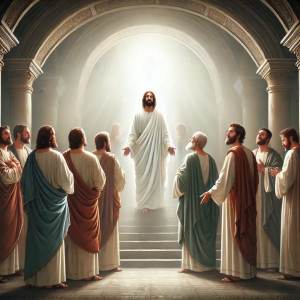Catholics believe that Tradition is as important as the Bible, and this understanding makes perfect sense when we look at how the Bible itself was formed. In the early years of the Church, Christians did not have the complete New Testament, and what kept the teachings of Jesus alive was oral Tradition, passed down from generation to generation. The first book of the New Testament, which was Saint Paul's First Letter to the Thessalonians, was written around 50 A.D., about 20 years after Christ's resurrection.
During this time, the teachings of Jesus were transmitted orally through the preaching of the apostles and Christian communities. Tradition played a crucial role in this process. Even after the books of the New Testament were written, it took several centuries for the Church to officially define which texts would be included in the Bible. The canon of the Bible was closed only at the end of the fourth century, at the Council of Carthage in 397 A.D. Until then, the faith was lived and taught primarily through Tradition, with the apostles and their successors preserving and transmitting the teachings of Christ.
The letters of the New Testament, such as those of Paul, Peter, and John, were written for very specific purposes: to guide, correct, and strengthen Christian communities. They were not initially intended to form the Bible; they were read in churches to encourage Christians and help them live according to the Gospel. Only later did the Church, through Tradition, discern which of these writings were inspired by God and should become part of the Scriptures.
So, to say that "Tradition is as important as the Bible" is to recognize that without Tradition, we would not even have the Bible as we know it. It was Tradition that preserved the teachings of Christ in the early centuries, and it was through Tradition that the Church was able to identify which books should compose the New Testament. Moreover, Tradition helps us correctly interpret the Scriptures. Without it, each person could interpret the Bible differently, leading to confusion and divisions.
A clear example of this is the Eucharist. The Catholic belief that the bread and wine become the Body and Blood of Christ is rooted both in the words of the Bible and in the practice of the Church since the time of the apostles. Tradition, over the centuries, has helped the Church understand and live this reality more deeply, preserving the teaching that Jesus transmitted at the Last Supper.
Therefore, for Catholics, Tradition is as important as the Bible because both come from the same source: God. They walk together, complementing each other, and are indispensable for the life and faith of the Church. Tradition is living, guided by the Holy Spirit, and ensures that the message of Christ continues to be fully understood and lived through the ages.

Tradition and Bible: Complementary Paths
Catholics believe that Tradition is as important as the Bible because both come from God and complement each other. Tradition preserved and transmitted Jesus' teachings even before the complete New Testament was formed.

A Fruit of Tradition
The Bible as we know it was only defined in the fourth century, when the Church, through Tradition, discerned which writings were inspired by God. Tradition preserved Christ's teachings until the canon was established.

Tradition: A Guide to Interpreting the Bible
Tradition helps interpret Scripture, ensuring unity of faith. Without it, individual interpretations could cause divisions.
-
2 Thessalonians 2:15 – "Hold fast to the traditions" indicates the importance of Tradition, passed on orally.
-
John 21:25 – "Not everything is written" reminds us that Jesus' teachings go beyond Scripture.
-
1 Corinthians 11:2 – "Maintain the traditions" reinforces the practice of Tradition in the early Church.
-
2 Timothy 2:2 – "Teach others" shows the oral transmission of faith as part of Tradition.
-
John 16:12-13 – "I have much more to say" indicates that the Holy Spirit continues to guide the Church beyond the Scriptures.
-
Matthew 28:19-20 – "Teach all nations" points to the apostles' responsibility to pass on the faith.
-
Acts 2:42 – "They devoted themselves to doctrine" shows that early Christians followed teachings beyond Scripture.
-
1 Thessalonians 2:13 – "Received as the word of God" includes apostolic preaching as the Word of God.
-
2 Peter 1:20-21 – "No prophecy is of private interpretation" highlights the need for the Magisterium to interpret the Bible.
-
1 Corinthians 15:1-2 – "I passed on what I received" reinforces the oral passing of faith, essential in Tradition.
While every effort is made to ensure accuracy and conformity with the teachings of the Catholic Church, we acknowledge that errors in interpretation or presentation may occur. If you identify any answer or content that is not in line with the official teachings of the Church, we kindly ask you to inform us. We are committed to reviewing and promptly correcting any errors that are identified.
We understand that fidelity to the Church’s doctrine is fundamental, and for this reason, we value users' collaboration in maintaining the integrity of the content presented.
We thank you for your understanding and commitment to the Catholic faith.







